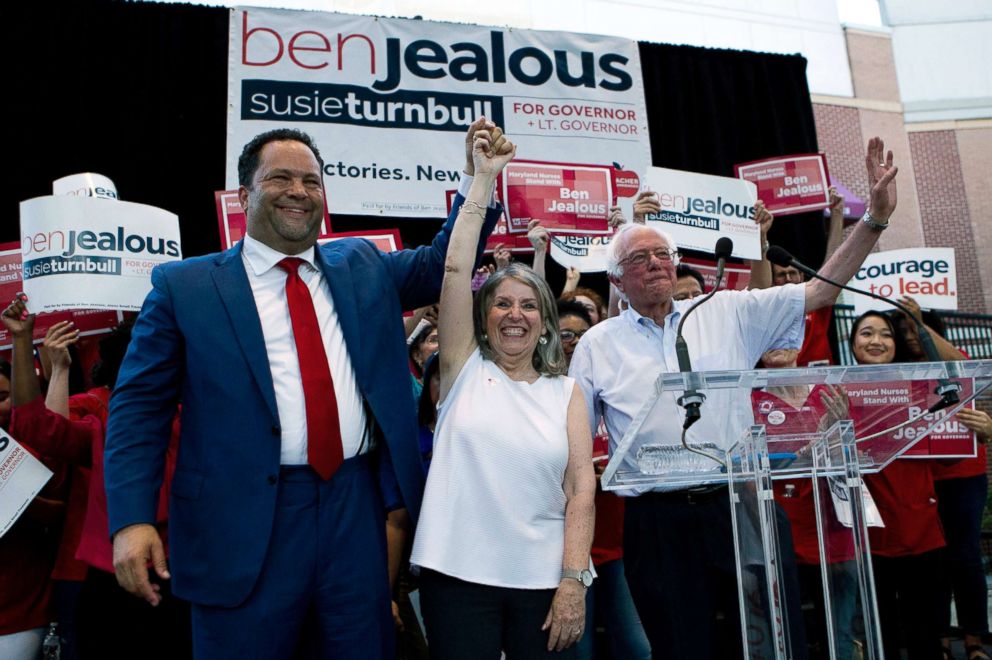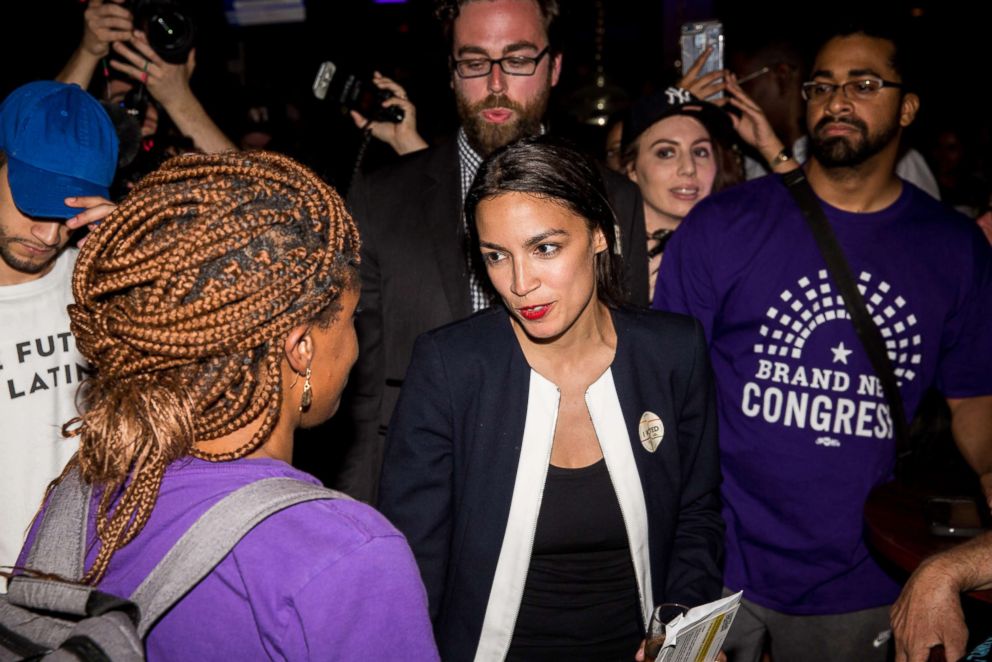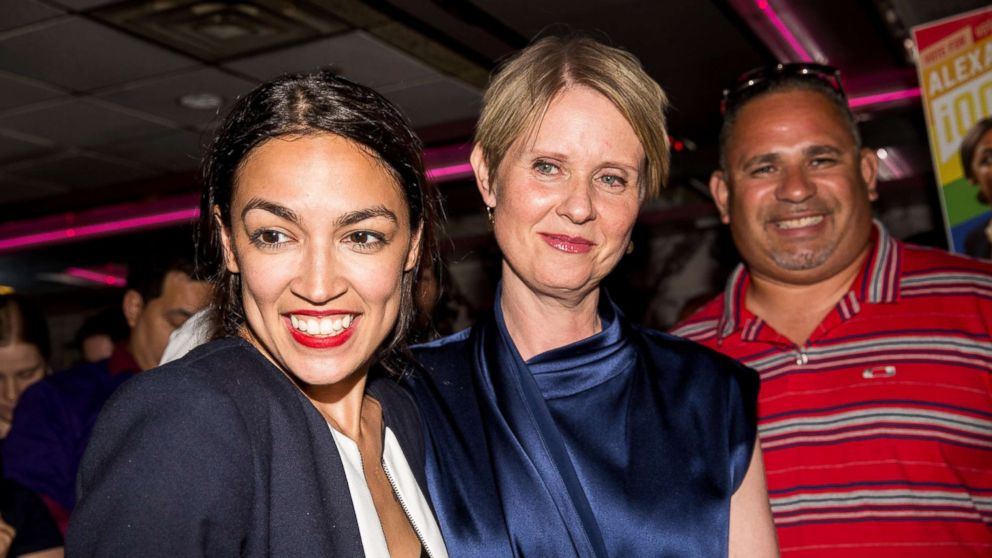[ad_1]
Recent primary wins among progressive minority candidates could prove a key part of a broader electoral strategy for Democrats hoping to create a so-called “blue wave” in November, advocacy groups say.
Interested in Midterm Elections?
Add Midterm Elections as an interest to stay up to date on the latest Midterm Elections news, video, and analysis from ABC News.
“The formula to win elections is to have high turnout and overwhelming support from communities of color and to hold a meaningful minority of whites who vote progressive,” Steve Phillips, founder of Democracy in Color, a political organization focused on what it calls the “New American Majority”, told ABC News.
The sentiment was echoed by former NAACP president and CEO Ben Jealous on the heels of his win in the Maryland gubernatorial primary earlier this week. He credited his win to the ability to bring together a variety of progressive movements and an agenda that “represents all of our ambitions.”
 Jose Luis Magana/AP
Jose Luis Magana/AP“We were successful because our coalition, like our state, has as many people of color as white people,” said Jealous, who would become Maryland’s first black governor if he wins the general election in November.
Stacey Abrams, who this May was the first black woman to be a major party’s nominee for governor, explained her strategy on Tuesday on Late Night with Seth Meyers.
“My approach is every Democratic voter that we can get, especially those who don’t think their voices matter,” she said, adding later that “the reality is people who do not vote don’t vote because we haven’t given them a reason to vote. They haven’t had their issues reflected in the candidates.”
And in the Bronx on Tuesday night, in a stunning upset, Alexandria Ocasio-Cortez, 28, a member of Democratic Socialists of America, defeated incumbent Rep. Joe Crowley, campaigning on liberal priorities like Medicare for all, a federal jobs guarantee, and abolishing ICE.
Ocasio-Cortez said on “The View” on Friday that America’s working class is the future of the Democratic Party.
“I believe that our power as a party is in organizing people — a mass movement of people,” she said.
 Scott Heins/Getty Images
Scott Heins/Getty ImagesAbrams, Ocasio-Cortez, Jealous and others appear to be part of a trend among minority candidates who have defeated moderate Democrats by campaigning on liberal policy priorities.
Key to that strategy is mobilizing people who don’t vote regularly, mostly people of color and progressive white voters. “You do that by organizing,” Jealous said. “We will build an army of organizers across our state to turn out voters by talking to them.”
Part of that strategy is recognizing the that there is often a gap between eligible Democratic voters and the margin of victory, said Phillips, author of “Brown is the New White: How the Demographic Revolution Has Created a New American Majority”.
In Maryland, he said, only 800,000 Democratic voters turned out for Hogan’s 2014 election, compared to about 1.1 million who turned out to elect former Governor Martin O’Malley.
Those voters, Phillips and others have argued, could be swayed to turn out with a progressive agenda of economic and social justice.
Jealous said that as the former president of the NAACP, he knows how to bring out voters.
Like Ocasio-Cortez, he campaigned on Medicare for all, as well as free tuition at public colleges and universities in Maryland, police reform and legalizing the recreational use of marijuana.
Other Democratic candidates using this strategy include David Garcia, who is running for governor in Arizona, Chardo Richardson running in Florida’s 7th Congressional District and Cori Bush, running in Missouri’s 2nd Congressional District.
While candidates of color have embraced this strategy the most, Phillips said that white candidates “can and should” use it as well, citing New York’s Mayor Bill De Blasio and U.S. Rep. Sherrod Brown, D-Ohio, as examples of those who are.
“Unfortunately much of the Democratic white establishment does not believe in this strategy,” Phillips said. “They still harbor this notion that you can win back Trump voters without the empirical evidence.”
If the Democrats fail to more tightly hone its focus on mobilizing voters of color through grassroots organizing and a progressive appeal, Phillips said the party will not only lose elections but also permanently turn off part of its constituency.
Whether or not this strategy will help Jealous win in November remains to be seen.
Michael Steele, former chairman of the Republican National Committee, who was also Maryland’s first black lieutenant governor, told ABC News that this primary result was typical where voters tend to be more on the extremes of their party.
“I think Governor Hogan has a superior advantage,” Steele said, adding that Hogan has been good at getting voters to see the national Republican party as different from what he has been doing in Maryland.
“In a state like Maryland, they have good reason to be excited about [Jealous’] chances,” he added, but Hogan, also has a strong shot since he “has been able to have successes without raising taxes, without growing the size of government, without giving away a whole lot of free stuff.”
ABC News’ Lee Harris contributed to this report.
[ad_2]
Source link

